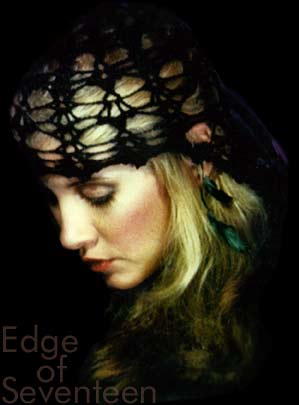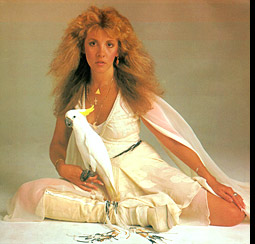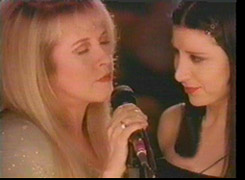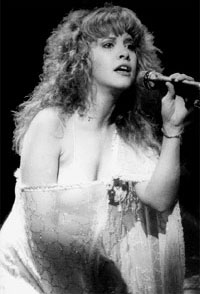|
|
|
|
|
|
|
|
|
I had lived up in the hills with Jimmy [Iovine] for almost six months. He was
coming to the end of Tom Petty's album...it seemed I had waited a long time, and
since no one really knew where I was, I was starting to get very edgy to do something....
I was also starting to feel very unimportant and very sorry for myself. I was
ready to begin Bella Donna and it seemed like it would just never happen.
Jimmy had told me many times about his incredible friendship I went home to Phoenix... and went to visit my uncle (who was very sick), not
knowing that no one but his son, John, was there... and I sat on his bedside,
while John sat on the floor beside him, and we stayed there. My father did not
come, nor my mother... nor my aunt... so I sat there and held his hand, and sometime
right about sunset, he turned his head slightly to John, and then to me, and his
hand slowly let go of mine. I did run out into the hallway, but no one was there...
and the white winged dove took flight... 'Well I hear you, in the morning.... Goodbye to you both, I said.... |
||
|
|
The line 'And the days go by like a strand in the wind' that's how fast
those days were going by during my uncle's illness, and it was so upsetting to
me. The part that says 'I went today... maybe I will go again... tomorrow'
refers to seeing him the day before he died. He was home and my aunt had some
music softly playing, and it was a perfect place for the spirit to go away. The
white-winged dove in the song is a spirit that is leaving a body, and I felt a
great loss at how both Johns were taken. 'I hear the call of the nightbird
singing..... come away ... come away....' |
|
|
And my aunt's house, when my uncle died, was like, very pale yellow... very ethereal. And there was just real quiet music playing. And, 'So I went today, maybe I will go again tomorrow. The music there, it was hauntingly familiar. And I see you doing what I tried to do for me, with the words of a poet, and the voice of a choir and a melody... and nothing else mattered.' And I just sat there and held his little hand, and he died. The end of the
song, it says, 'I hear the call of a nightbird, singing come away...',
and that's when I felt that the black bird was taking the white bird to wherever.
And it was terribly sad. And I was like, holding his hand when he died. And I
really felt the loss of these spirits. And that's the white winged dove, that's
the spirit. |
||
|
And when we recorded the song, the energy that was written into that song was so intense that it took us about two nights to get the track to that, and it's like nobody's feet ever stopped moving. It was like there was this energy that was so strong. I cried in the middle of the bridge thing, about the sea never expects it when it rains but the sea changes color, but the sea does not change. And so with the slow graceful flow of age, I went forth with an age old desire to please. It was like, well we have to keep going now. And I wanted that song to have all that energy of them and of us going on. And it was quite incredible to see, especially that entity of the band that
played on that song. And they just put every bit of their heart and soul into
it. It was like they just stood right there and held my elbows, you know, so that
I could just stand really tall and sing that song for my uncle and for John Lennon
and for everybody. And understand that we were doing what both of them would have
wanted us to do. I said, 'My Uncle John wouldn't have wanted me to cry. He would
have wanted me to write. He would have wanted me to go straight to the piano.
' You want the story and I'll give it to you.' |
||
|
|
||
|
|
The immediate inspiration is from Jane Petty, who is Tom's wife, because she
told me that when she met Tom he was, she said, 'at the age of seventeen' but
she has this incredible southern drawl so it sounded like 'edge of seventeen'
and I said, 'Jane, (I 'm writing it on the menu, right! Im going...) I'm writing
a song called Edge of Seventeen.' And she laughs, you know, she didn't ever think
I was ever serious. So it started out about Tom and Jane basically, who I have
no idea what they were at 17, but I made it up. And, uh it went into being written
about [her Uncle Jon and John Lennon]. |
|
|
|
The most recent [song on Bella Donna] is Edge of Seventeen, which
is also my favorite song on the record.... Edge of Seventeen closes it
[the album] ~ chronologically, anyway ~ with the loss of John Lennon and an uncle
at the same time. That song is sort of about how no amount of money or power could
save them. I was angry, helpless, hurt, sad. |
|
|
Um, I went home to Phoenix and I had this idea about writing a song about him
about the white wing dove. Which comes from uh, Arizona and like nests in the
Saguaro cactus. But I didn't know that until I got to Phoenix and started writing
this song and somebody told me that. And then to make a bad situation worse, um
my uncle who was my dad's older brother, very close brothers ~ family my dad's.
And uh, he was very sick. And um, I went to visit him one day, couple weeks after
that. And my cousin Jon, whose name also was Jon, we, we were both there and for
some reason nobody else was there and my uncle died. And we were, we were just
there by ourselves with him and we didn't even know what to do. It was like, I
can't believe this is happening. So when it says you know, 'And I went running
down the hall searching for somebody and up the stairs and down the hall, I did
not hear an answer but I did hear the call of the nightbird,' that's what
that was about. |
||
|
|
Edge of Seventeen definitely ~ that's probably the closest to being
my favorite [song]. It was written about my uncle Jon having cancer and and that
was about the time of [the murder of] John Lennon, and it was right before we
knew Robin was sick ~ the final 'white winged dove.' When it starts playing my
head turns around. |
|
|
|
Jimmy [Iovine] was absolutely best friends with John Lennon. So when that happened, a hush came over the house that was so overwhelming that there was nothing that I could do to help. There was nothing I could say, there was no way I could comfort him. [Unable to help, Nicks flew home to Phoenix] I went straight over to my uncle's house, and my uncle died that day. He died right there with me holding his hand, just me and my cousin, who's a little younger than me, sitting there on the bed and on the floor next to him.
|
|
|
|
|
|


 with
John Lennon; how John had taken Jimmy in and taught him to record. He was his
teacher... and I was entranced because I could not imagine these two together.
Anyway, it was a real life fairy tale and I believed it. Then one grey day, the
fairy tale ended... Jimmy's friend was dead... But Jimmy's love for John did not
die. A terrible sadness set in over the house, there was simply nothing I could
say. So I went home... Jimmy would have to go this one alone.
with
John Lennon; how John had taken Jimmy in and taught him to record. He was his
teacher... and I was entranced because I could not imagine these two together.
Anyway, it was a real life fairy tale and I believed it. Then one grey day, the
fairy tale ended... Jimmy's friend was dead... But Jimmy's love for John did not
die. A terrible sadness set in over the house, there was simply nothing I could
say. So I went home... Jimmy would have to go this one alone.
 This
was one of those impulsive things that you could never do again... So we put the
earphones on, they turned the track up and we just sort of doubled it ~ which
is what we do in the studio... So I said, 'Well if God is with us, it's a big
risk' and we did it perfect.
This
was one of those impulsive things that you could never do again... So we put the
earphones on, they turned the track up and we just sort of doubled it ~ which
is what we do in the studio... So I said, 'Well if God is with us, it's a big
risk' and we did it perfect. What
happened with this song was I was in Australia with, hanging out, playing, doing
something with some band and uh, John Lennon died. So, I was of course upset by
this and I was very far away and it was really strange to not be in the country
when he died.
What
happened with this song was I was in Australia with, hanging out, playing, doing
something with some band and uh, John Lennon died. So, I was of course upset by
this and I was very far away and it was really strange to not be in the country
when he died.  I
have to deal with it every single night when I sing it. That's why I can [sing
it]. When that song starts, I go back to that week. And it's not like I try. I
don't make a physical effort to do it. In my mind, my little timespace, I'm back
in the house at Encino finding out that news, and when I sing it to everybody,
I try to make them understand in a way what I was talking about without actually
telling them. That's why I can sing Edge of Seventeen just like I wrote
it yesterday. Because it will never, ever lose the intensity. I will never forget
how I felt when that happened to me. And when people read this, they're going
to understand that this hasn't been so glamorous, and each one of these songs
was one more chip off an already broken heart.
I
have to deal with it every single night when I sing it. That's why I can [sing
it]. When that song starts, I go back to that week. And it's not like I try. I
don't make a physical effort to do it. In my mind, my little timespace, I'm back
in the house at Encino finding out that news, and when I sing it to everybody,
I try to make them understand in a way what I was talking about without actually
telling them. That's why I can sing Edge of Seventeen just like I wrote
it yesterday. Because it will never, ever lose the intensity. I will never forget
how I felt when that happened to me. And when people read this, they're going
to understand that this hasn't been so glamorous, and each one of these songs
was one more chip off an already broken heart.